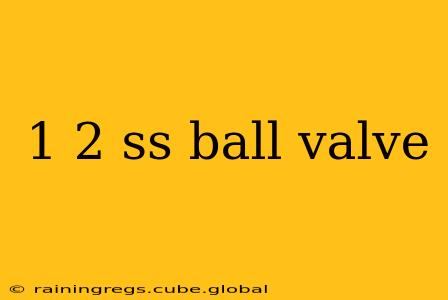Ball valves are essential components in various industrial and residential plumbing systems, controlling the flow of liquids or gases. This guide delves into the specifics of 1 1/2" stainless steel (SS) ball valves, exploring their features, applications, and considerations for selection and maintenance. We'll address common questions surrounding this type of valve to provide a comprehensive understanding.
What is a 1 1/2" SS Ball Valve?
A 1 1/2" SS ball valve is a type of quarter-turn valve with a spherical "ball" inside, featuring a bored through-hole. This hole aligns with the valve's inlet and outlet when open, allowing fluid to flow freely. The "1 1/2"" refers to the nominal pipe size – the internal diameter of the pipe the valve is designed to fit – and "SS" indicates that the valve body is constructed from stainless steel. This material choice makes these valves highly durable, corrosion-resistant, and suitable for a wide range of applications.
What are the Advantages of Using a 1 1/2" SS Ball Valve?
Stainless steel ball valves offer numerous advantages over other valve types:
- Simple On/Off Operation: A quarter-turn of the handle is all it takes to open or close the valve, making operation quick and efficient.
- Corrosion Resistance: Stainless steel's inherent resistance to corrosion makes it ideal for applications involving harsh chemicals or corrosive fluids.
- Durability: SS ball valves are built to last, capable of withstanding significant pressure and temperature variations.
- Compact Design: Their compact design saves space, especially beneficial in confined areas.
- Low Maintenance: With minimal moving parts, SS ball valves generally require little maintenance.
- Tight Shut-Off: They provide a reliable seal, minimizing leaks.
What are the Different Types of 1 1/2" SS Ball Valves?
Several variations exist within the 1 1/2" SS ball valve category:
- Full-Port Ball Valves: These offer unrestricted flow, minimizing pressure drop. Ideal for applications where maximum flow is crucial.
- Reduced-Port Ball Valves: These have a smaller internal diameter than the nominal pipe size, leading to some pressure drop but often a more compact design.
- Floating Ball Valves: The ball is not fixed and relies on pressure to maintain its position. Generally less expensive.
- Trunnion Ball Valves: The ball is supported by trunnions (shafts), providing greater strength and stability at higher pressures.
The choice depends on specific application requirements.
What are the Common Applications of 1 1/2" SS Ball Valves?
These versatile valves find application in diverse industries and settings:
- Chemical Processing: Handling corrosive chemicals and fluids.
- Food and Beverage: Maintaining hygiene and preventing contamination.
- Pharmaceutical: Meeting stringent sanitary requirements.
- Water Treatment: Controlling water flow and preventing leaks.
- Oil and Gas: Managing the flow of hydrocarbons.
- HVAC Systems: Controlling the flow of liquids and gases.
How Do I Choose the Right 1 1/2" SS Ball Valve?
Choosing the appropriate valve requires considering several factors:
- Pressure Rating: Ensure the valve's pressure rating exceeds the operating pressure of your system.
- Temperature Rating: Verify compatibility with the operating temperature range.
- Material Compatibility: Check for compatibility with the fluid being handled to avoid corrosion.
- End Connections: Select the correct end connections (e.g., threaded, flanged, weld) to match your piping system.
- Flow Capacity: Choose a valve with sufficient flow capacity to meet your needs.
How Do I Maintain a 1 1/2" SS Ball Valve?
Regular maintenance is crucial for ensuring optimal performance and longevity:
- Regular Inspection: Inspect the valve periodically for leaks, damage, or wear.
- Lubrication: Apply lubrication to the stem as needed to ensure smooth operation.
- Cleaning: Clean the valve exterior regularly to remove debris or contaminants.
Following these guidelines will extend the lifespan of your 1 1/2" SS ball valve.
What are the potential problems with 1 1/2" SS ball valves?
While highly durable, potential issues can include:
- Leakage: This can stem from worn seals or improper installation.
- Seizing: This can occur due to lack of lubrication or corrosion.
- Stem Damage: Over-tightening or impact can damage the stem.
Regular inspection and maintenance significantly reduce these risks.
This comprehensive guide aims to provide a thorough understanding of 1 1/2" SS ball valves. Remember that consulting with a qualified professional is always advisable for specific applications and installations.
